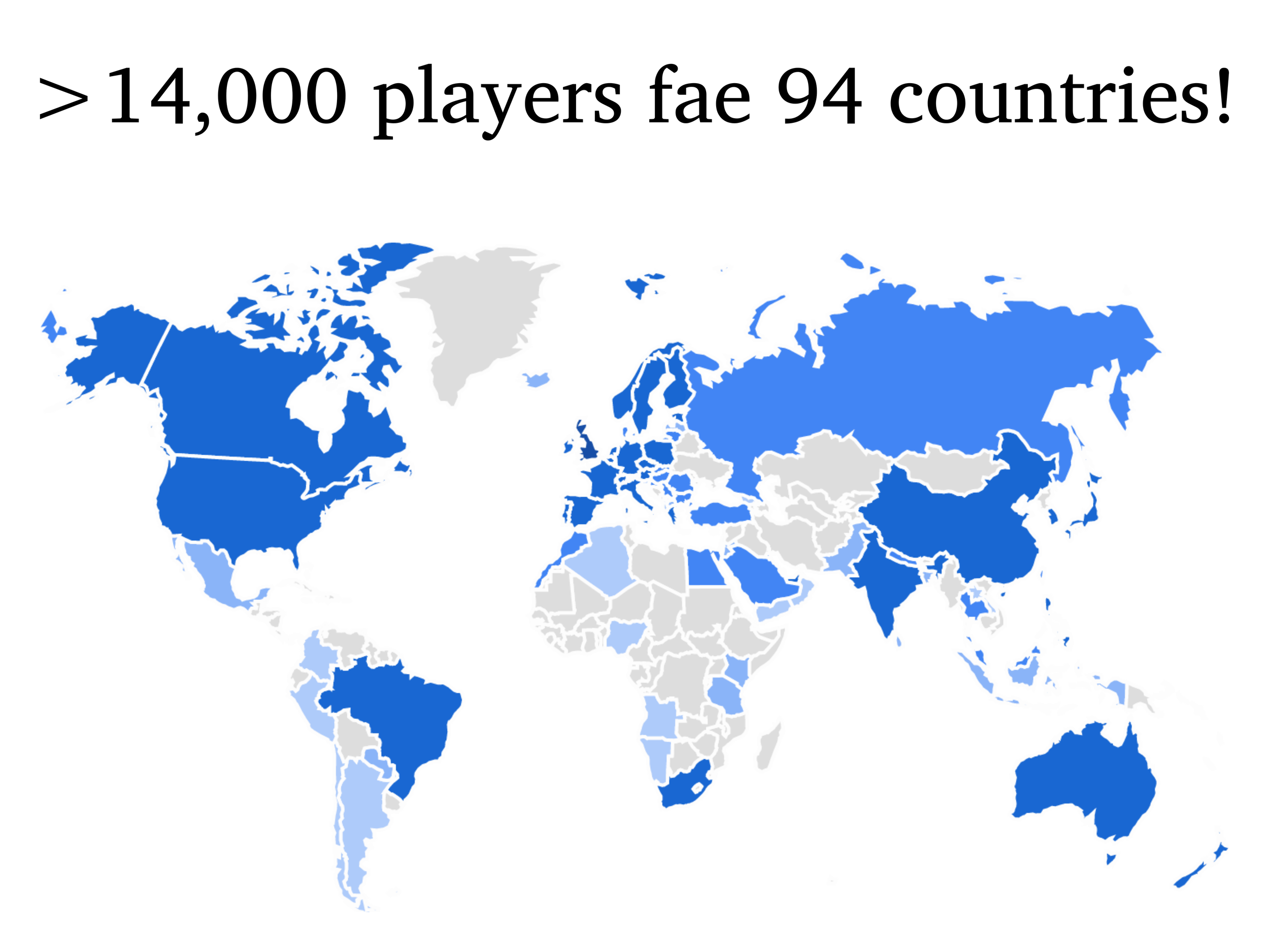Wirdle solutions week 15
We're pleased to announce that as of today the Shaetlan Wirdle has had more than 14,000 players from 94 countries. Here are the solutions for this week! Scroll for one word at a time to get the correct answer, it's meaning, and the history of the word. Last you'll find the main references we use for the etymologies, and the latest map of players. You'll find the principles of our spelling system at https://www.iheardee.com/english/spelling-in-shaetlan.
✅
It's important to remember that "Old English" was never a monolithic language, but rather is a cover term for four distinct North Sea Germanic varieties. The direct ancestor of Scots was Northumbrian Old English. The direct ancestor of English was Mercian Old English. But most of the existing data comes from West Saxon Old English. Wherever possible we have given the Northumbrian Old English forms, since the main ancestors of Shaetlan are Norn and Scots (not English), with a lot of Dutch/Low German influence.
✅
With thanks again to Julie for hatching the idea and to Andrew for making it possible! 🤗
hoose ‘house’
History: Old Scots has various forms for this word, such as houis(e), ho(u)s(s)(e), hu(s)se, hus(s), hoos(e), etc. They come from the Old English hūs and reflect that earlier pronunciation (the Standard English pronunciation with an au-diphthong is a later development). The word is inherited from Proto-Germanic *hūsą of debated origin, but possibly from Proto-Indo-European *(s)kewH-s- ‘cover’, a nominal derivation of *(s)kewH- ‘to cover, hide’.
banks ‘coastal cliffs’, plural of bank ‘edge’
History: this is an early loan from Scandinavian into both English and Scots. The Old Norse bakki ‘bank (of a river, lake, etc.), ridge, embankment, hill, etc’ survives in Icel., Far. bakki, ‘bank, cliff’ No., Da., bakke, and Sw. backe, ‘hill’. It descends from the Proto-Germanic *bankô ‘bank, embankment; hill’, which in turn comes from Proto-Indo-European *bhong‑eh2‑ ‘raised surface, bulge’.
baith ‘both’
History: this word is partly an Old English compound and partly a loan from Old Norse. Old Scots has bathe, baith. The Old English baðe is a compound of bā þā ‘both the, both those’. It was reinforced by the Old Norse báðir ‘both’ (which survive in Icel., Far. báðir, No., Da., både, Sw. båda ‘both’). The forms ultimately go back to Proto-Germanic *bai ‘both’ which comes from Proto-Indo-European *bʰoh₁ ‘both’.
stank ‘ditch in which water stands’
History: the Old Scots stank ‘a ditch, pond’ is attested from ca 1400. It is a loan in both Scots and English from Old French estanc ‘a pool, pond’, which descends from Latin stāgnum ‘pond, swamp, fen; standing water’. The ultimate origin is obscure, but might go back to Proto-Indo-European *steh₂g- ‘to seep, drip’.
pleep ‘to cry, whine, complain’
History: this word is mainly found in Orkney and Shetland. The etymology is imitative of the high, shrill sound of birds, especially young birds. Similar forms are also found in Danish, Swedish and Norwegian as pipe, as well as in Dutch and German as piepen.
afore ‘before’
History: the Old Scots aforne descends from Old English onfora. It is a compound of a ‘on’ + fore ‘in front of’, which comes from Old English fōra, in turn descended from Proto-Germanic *fura(i)- ‘before, in front of, for’, which ultimately comes from Proto-Indo-European *per- ‘before, in front; first’. The preposition a ‘on’ represents an archaic form of Old English an ‘on’. For more about that, see our post from 17 November 2021.
faels plural of fael ‘sod, turf’
History: the Old Scots fayle, faill, etc. are attested from ca 1420 with the meaning ‘turf’ and from 1513 with the meaning ‘a sod’. The word is a loan from the Scots Gaelic fàl ‘sod, turf’, which comes from Old Irish fál ‘fence, hedge, enclosure’ (which is also the origin of the Pictish fahel). It ultimately goes back to the Proto-Indo-European root *wel- ‘to turn, wind, roll’.
References
Bokmålsordboka. 2022. Språkrådet og Universitetet i Bergen. Available at http://ordbøkene.no.
Christie-Johnston, Alastair & Adaline Christie-Johnston. 2014. Shetland words. A dictionary of the Shetland dialect. Lerwick: The Shetland Times.
de Vaan, Michiel. 2008. Etymological dictionary of Latin and the other Italic languages. Leiden, Boston: Brill
de Vries, Jan. 1977. Altnordisches etymologisches Wörterbuch. Leiden: Brill.
DSL Online. 2002. Glasgow: The University of Glasgow. Available at https://dsl.ac.uk/.
Heggestad, Leiv, Finn Hødnebø & Erik Simensen. 1993. Norrøn ordbok. 4th edn of Gamalnorsk ordbok. Oslo: Det norske samlaget.
Hellquist, Elof. 1993. Svensk etymologisk ordbok. 3rd edn. 2 Vols. Malmö: Gleerups.
Jakobsen, Jakob. 1985 [1928]. An etymological dictionary of the Norn language in Shetland. Lerwick: The Shetland Times.
Kroonen, Guus. 2013. Etymological dictionary of Proto-Germanic. Leiden: Brill.
Lehmann, Winfred P. 1986. A Gothic etymological dictionary. Leiden: Brill.
Macbain, Alexander. 1911. An etymological dictionary of the Gaelic language. Stirling: Eneas Mackay.
Marwick, Hugh. 1929. The Orkney Norn. Oxford: Oxford University Press.
Matasović, Ranko. 2009. Etymological dictionary of Proto-Celtic. Leiden: Brill.
Nielsen, Niels Åge. 1995. Dansk etymologisk ordbog. Ordenes historie. 4th edn. København: Gyldendal.
Nynorskordboka. 2022. Språkrådet og Universitetet i Bergen. Available at http://ordbøkene.no.
OED Online. 2021. Oxford: Oxford University Press. Available at https://www-oed-com.ezproxy.uni-giessen.de.
Orel, Vladimir. 2003. A handbook of Germanic etymology. Leiden: Brill.
Pfeifer, Wolfgang (ed.). 1997. Etymologisches Wörterbuch des Deutschen. München: Deutscher Taschenbuch Verlag.
Pokorny, Julius. 1994. Indogermanisches etymologisches Wörterbuch. 3rd edn. 2 Vols. Tübingen: Francke Verlag.
Torp, Alf. 1919. Nynorsk etymologisk ordbok. Kristiania: Forlaget H. Aschehoug & Co.
Zoëga, Geir T. 1896. English-Icelandic dictionary. Reykjavík: Sigurður Kristjánsson.
Zoëga, Geir T. 1922. Icelandic-English dictionary. 2nd edn, enlarged. Reykjavík: Sigurður Kristjánsson.

